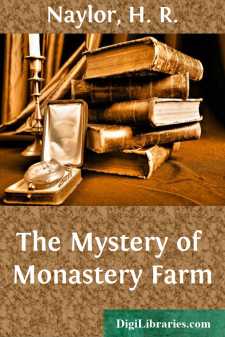Categories
- Antiques & Collectibles 13
- Architecture 36
- Art 48
- Bibles 22
- Biography & Autobiography 813
- Body, Mind & Spirit 142
- Business & Economics 28
- Children's Books 15
- Children's Fiction 12
- Computers 4
- Cooking 94
- Crafts & Hobbies 4
- Drama 346
- Education 46
- Family & Relationships 57
- Fiction 11828
- Games 19
- Gardening 17
- Health & Fitness 34
- History 1377
- House & Home 1
- Humor 147
- Juvenile Fiction 1873
- Juvenile Nonfiction 202
- Language Arts & Disciplines 88
- Law 16
- Literary Collections 686
- Literary Criticism 179
- Mathematics 13
- Medical 41
- Music 40
- Nature 179
- Non-Classifiable 1768
- Performing Arts 7
- Periodicals 1453
- Philosophy 64
- Photography 2
- Poetry 896
- Political Science 203
- Psychology 42
- Reference 154
- Religion 513
- Science 126
- Self-Help 84
- Social Science 81
- Sports & Recreation 34
- Study Aids 3
- Technology & Engineering 59
- Transportation 23
- Travel 463
- True Crime 29
The Mystery of Monastery Farm
by: H. R. Naylor
Description:
Excerpt
CHAPTER I
A GREAT BANK ROBBERY
On the eleventh day of April, 18—, the officers of the Bank of England were greatly excited on receiving notice of a special meeting called for that night at ten o'clock, an unusual hour, and indicating, surely, something of great importance. Promptly at the hour appointed fifteen directors occupied their usual places in the council chamber. There were also present two paying tellers, which was not usual. Besides these two bank clerks was observed Major Andrews, the well-known chief of the Bow Street detective service, and by his side sat two of his assistants. As yet, there were only five persons present who knew the cause of this meeting—the president, cashier, and the chief and his assistants.
No time was permitted to waste. The president of the bank in a few nervous words asked the cashier to state the object of the call. Mr. Bone at once stated that there were strong indications that a robbery of the bank had been perpetrated; that a large amount of currency had been abstracted from the paying teller's room. Hence this sudden call for consultation; this, also, accounted for the unusual presence of Chief Andrews and his colleagues. He then called on Mr. Roe, the senior paying teller, to make a statement of what he knew of the matter.
Mr. Roe arose, and told that at nine o'clock that morning in his preparations for business he had brought from the vault a quantity of currency and placed it with other moneys on a side table conveniently situate for ready use. And that when, about two o'clock, he had occasion for its use, it was gone. Everything possible had been done to gain a clue, but there was not the slightest thing upon which to hang the faintest suspicion.
Major Andrews, stepping in front of the table, then requested permission to ask Mr. Roe a few questions simply for information. This permission was at once granted.
"Mr. Roe," asked the chief, "what was the general appearance of this money? Was it loose or in a package?"
"It was a neat package," replied Mr. Roe, "wrapped in brown paper, with its character and value marked distinctly on the wrapper."
"You say," said the chief, "'character and value distinctly marked on the wrapper.' Please to explain what you mean by these terms."
"I mean," replied the teller, "by 'character' that there were one hundred and fifty one-thousand-pound notes, and by 'value' the value of the package—one hundred and fifty thousand pounds."
"Mr. Roe," continued the major, "is it the custom of your department to have so large an amount of currency upon your side table?"
"No, sir," replied the teller, "but I had been notified that a large draft would be presented today, and this package came nearest to the amount spoken of; consequently, I selected and brought it to my table out of the vault to be in readiness to pay the draft when presented."
"You say you had been notified that a large draft would be presented. May
I ask who notified you?"
"The cashier told me this morning when we were getting ready to open," was the prompt reply....


